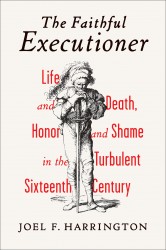In 1624, when he was 70 years old, Frantz Schmidt of Nuremberg, Germany, petitioned Emperor Ferdinand II for the return of his honor, along with the honor of his family.
The petition was necessary because of Schmidt’s profession, which he had inherited from his father. [rquote]For 45 years he tortured and executed hundreds of criminals on behalf of the state, which earned him a good living but left him excluded from his community.[/rquote]
“The worst way to die was by the wheel,” said Joel F. Harrington, a Vanderbilt University history professor who researched Schmidt’s story after finding a 1913 publication of the executioner’s journal in a German bookstore. Harrington presents his research in the new book The Faithful Executioner (Farrar, Straus and Giroux).
“They would stake the person to the ground and put slats under all the joints,” he said. The executioner took a huge wagon wheel and if the authorities wanted to show mercy they would do it from the top down and break the neck first before the rest of the bones.
“But if they wanted to stretch it out – if the criminal had done especially atrocious things – they would do it from the bottom up and it could go to 35, 40 blows before death.”

One can understand how Schmidt – who was provided a large house and paid akin to a successful attorney – wasn’t the most popular fellow in town.
“Informally, people wanted nothing to do with him and his family,” said Harrington, professor of history. “They couldn’t enter a church, someone’s house, or a tavern, and even on the streets people shunned them.”
There were also legal restrictions that affected the next generation. For instance, an executioner’s children could not enter into certain trades or professions.
Harrington was particularly interested in how being an executioner impacted Schmidt. The executioner didn’t offer much direct evidence in his journals.
“The journal itself is not a diary in the modern sense of a lot of private confessions,” Harrington said. “But over the course of his lifetime, he starts to write sort of short stories of dialogue and you get more of a sense of his ideas and beliefs.”
Also, Schmidt’s heartfelt plea to the emperor was preserved, and Harrington was able to make some judgments based on the things Schmidt chose not to write about in the diary.
“He doesn’t mention torture much explicitly in the diary,” Harrington said. “In fact, he hardly mentions it at all. … The only time he mentions judicial torture is when somebody has been tortured based on false evidence. That gets him very upset.”

Also, Harrington notes that when Schmidt kills somebody using the wheel, he details their crimes at great length, as if to justify the gruesome torture he dishes out.
“He does not torture anybody accused of witchcraft,” Harrington said. “There were a few older women accused of witchcraft, and he told the authorities they would not be able to survive torture. He had a lot of latitude and discretion about torture.”
Interestingly, while torture and executions were commonplace in law enforcement, long-term incarceration was considered cruel and unusual in the 15th and 16th century and weren’t considered options. Schmidt came to be skeptical of the deterrence effect of killing criminals, Harrington said.
“That was a huge goal of the authorities,” Harrington said. “They would leave the bodies up there hanging or they would post the cut-off heads to scare people. But I think that Meister Frantz came to decide that these things have no effect at all on potential or active criminals.”
Schmidt’s plea for honor, however, did not fall on deaf ears. In September of 1624, Frantz’ petition was granted by the emperor “and his honorable status among other reputable people declared and restored.”